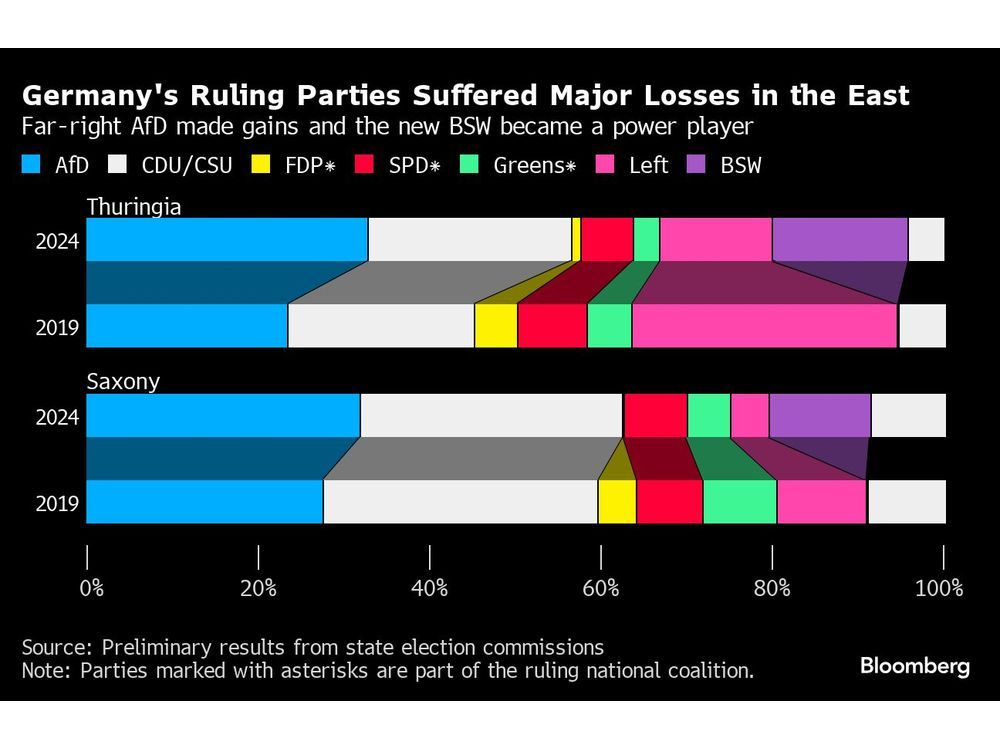
Article content
(Bloomberg) — A populist upsurge in elections in two eastern German states on Sunday sent the signal that opposition is growing to policies aimed at cleaning up Europe’s biggest economy.
The Greens, the main driver of Germany’s environmental push in Chancellor Olaf Scholz’s ruling coalition, suffered losses in Saxony and an even bigger blow in Thuringia. In the state that was won by the climate-skeptic Alternative for Germany, the Green Party was dumped from the legislature and 86% of voters in a poll by Infratest dimap for public broadcaster ARD said they were dissatisfied with it.
Article content
More bad news could come in three weeks, when Brandenburg — the state surrounding Berlin — votes for a new regional government. The latest poll shows support for the Greens at 5%, the threshold generally needed to secure seats in the legislature.
“The results make me worry,” Ingert Liebing, head of the Association of Public Local Utilities (VKU), said at a press conference for the group’s annual congress this week. “Our communities can now expect little support to move ahead their transformation.”
Germany wants to cut carbon emissions by two thirds by 2030 compared with 1990-levels and reach net zero by 2045, five years earlier than the European Union. While Germany’s stagnating economy needs investment, rising energy costs, the fallout from inflation and government budget battles have raised questions about climate policy.
The government’s willingness to act “will not increase, but will instead become paralyzed by shock,” said Belit Onay, the mayor of Hanover and a member of the Greens. “That is dramatic.”
With Germany facing vast changes, voters have little interest in more climate rules. The campaigns in both former communist states were mainly dominated by migration, social issues and weapons exports to Ukraine — just 4% to 7% of voters said climate protection was their primary concern, according to Infratest dimap.
Article content
The AfD — which in Thuringia claimed the first triumph for a far-right party in a German state ballot since World War II — doubts that climate change is man-made and have called for an end to the EU’s Green Deal and for Germany to exit the Paris Climate Agreement. That’s even more radical than France’s National Rally.
The party’s state chapters have also railed against a further expansion of wind energy and instead promoted a revival of imports of Russian natural gas.
The newly founded far-left BSW party — which came in third in both state ballots — said it wants to leave the decision to set up wind farms to local communities. That would overturn much of the central government’s recent efforts to accelerate the rollout of renewables.
“Expansion targets may be questioned in certain areas,” said Wolfgang Pielmaier from MoveOn Energy, which just set up the nation’s largest solar-power park in Saxony. Still, he’s hopeful decision makers will continue to support renewable expansion, in part because other parties have ruled out partnering with the AfD.
The Greens acknowledged the defeat and indicated that the party didn’t do enough to account for the impact of their policies on people’s pocket books.
“It’s clear that climate protection must be achieved while at the same time taking the impact on society into account,” co-leader Ricarda Lang said on Monday in an interview with public broadcaster Phoenix. “We must recognize that not everyone has the same possibilities.”
—With assistance from Iain Rogers.
Share this article in your social network